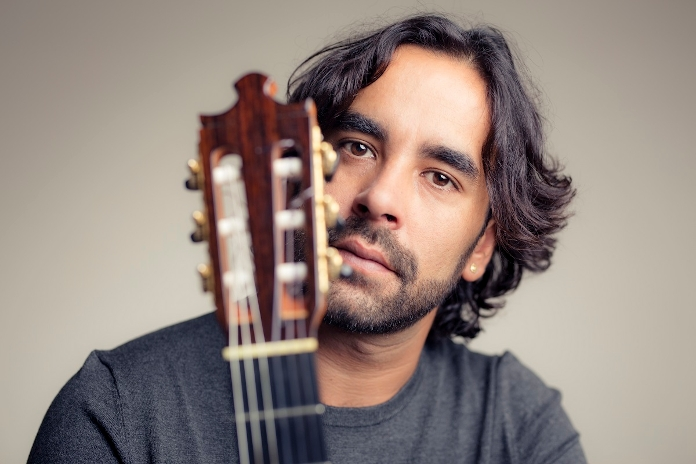
Daniel Casares, the prominent Spanish guitarist and composer, is one of the most influential figures in contemporary flamenco music and has come to Iran for the 40th Fajr Music Festival.
Born in 1980 in the El Limonar neighborhood of Málaga, Casares’ musical talent was evident from a young age—a talent that, in Spanish culture, is described by the term duende. His unique personality and distinctive performing style blend deep emotions and unmatched energy, which are reflected in the strings of his guitar.
We spoke with him about his presence at the 40th Fajr Music Festival.
How did your environment shape your artistic path?
I was born in Limonar, a neighborhood in Málaga, and I’m from Estepona, a beautiful city on the sunny coast of Málaga. Without a doubt, its influence has been immense because the light, joy, simple lifestyle, and tranquility of my city inspire me every day and push me to continually compose and create music.
As a child, you were given the title duende. What made people recognize this special talent in you?
Actually, my first album was titled Duende Flamenco because the record company decided to name it that.
At what age did you realize your love for the guitar, and who had the greatest impact on your early musical growth?
From a very young age, I loved the guitar and flamenco music. No one in my family was a musician.
At 13, you participated in the A la Guitarra de Estepona album. How did you get involved in this project, and what was the experience like for you?
It was a beautiful and formative experience, especially because I had the opportunity to share this recording with great guitarists.
At 16, you won the Bordón Minero de La Unión award. How did this early achievement impact your professional path?
Winning this award was undoubtedly a turning point in my career. This festival is the most important flamenco music event, so it was a huge success for me.
Your first album, Duende Flamenco, was released when you were 19. What challenges did you face during the recording process, and did you expect such a warm reception?
It’s true that the album was released at 19, but I had actually recorded it several years earlier, probably when I was 16. Due to company issues, its release was delayed. The album was well-received and motivated me to continue recording future albums.
Throughout your career, you’ve collaborated with artists such as Alejandro Sanz, Miguel Poveda, Dulce Pontes, and many others. Which of these collaborations has been the most special for you, and why?
Everyone I’ve had the honor of working with has taught me a lot. I can’t choose just one.
How did your collaboration with Cecilia Bartoli come about, and what was it like touring with her in Europe?
Cecilia is an amazing artist and a wonderful person. It was an incredible tour proposed by Universal, which I fondly remember, and I hope our paths cross again.
Alejandro Sanz served as the producer of your album El Ladrón del Agua. How did this collaboration come about, and how did it affect the production of the album?
Meeting Alejandro Sanz was a huge stroke of luck for me. He started a record company and invited me to record my next album with it. Afterward, I was fortunate to perform several live concerts with him, an experience I will never forget.
In 2010, you were chosen as the representative of European culture at the Shanghai Expo. How did you earn this honor, and what was it like performing at such a prestigious event?
It’s always a pleasure to be chosen as a representative of my musical culture. I was very pleased with the audience’s reaction in Shanghai and was happy to see firsthand how flamenco music can stir emotions in people worldwide. That’s the greatness of flamenco!
You’ve performed at many prestigious festivals worldwide. Which concert do you consider the most memorable of your career, and why?
The truth is that every concert I’ve performed in any city stays in my memory and heart. I have special memories from all of them.
In your album La Luna de Alejandra, you presented your first symphonic work. What inspired you to combine flamenco music with a symphonic orchestra?
I felt I needed to create a piece that aligned with my experience at the time, as I had just become a father, and my best gift in life, my daughter Alejandra, was born. Fortunately, the Málaga Philharmonic Orchestra joined the project, as it is one of the best orchestras in Spain.
How did your performance of Concierto de Aranjuez by Joaquín Rodrigo come about, and how did it feel to perform it for the 75th anniversary of the piece?
This proposal came from the Málaga Philharmonic Orchestra management. Studying this piece and experiencing performing it on stage with a large symphony orchestra was one of my dreams that came true.
In the album Picasares, you paid tribute to Pablo Picasso. How did this project come about, and what connection do you see between flamenco music and Picasso’s art?
I love painting, and undoubtedly, Picasso is mind-blowing to me. The strongest common ground between Picasso’s paintings and flamenco music is freedom.
One of the tracks on this album, created with Dulce Pontes and the lyrics of Antonio Martínez Áres, is dedicated to Picasso’s death. What inspired you to create this piece?
This piece is a thanksgiving, a grand farewell, and a sigh to the sky. Without the poetry of Antonio Martínez Áres and the voice of the dear Dulce Pontes, this work wouldn’t have been the same.
What do you think of the place flamenco occupies in today’s world, and what changes have you seen in this style?
Flamenco is music with deep roots that is fully open to the world and welcoming of other sister music genres. Sooner or later, the world will place flamenco in its deserved position.
Are you currently working on a new project? What can your fans expect in the future?
Yes, I am working on my latest live performance titled The Power of Softness. I am also preparing a new symphonic work.
If you were to give advice to young guitarists who want to follow your path, what would it be?
Without a doubt, they should enjoy what they do, always with respect, love, and commitment to music, but never forget to be happy.
Interview By Farid Parish
